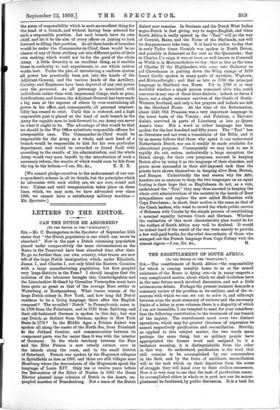LETTERS TO THE EDITOR.
CAN THE DUTCH BE ABSORBED ?
[TO THE EDITOR OP TEE " SPECTATOR."]
Sin,—Mr. C. Baumgarten in the Spectator of September 15th states that "the Dutch population is one which can never be absorbed." Now in the past a Dutch colonising population placed under comparatively the same circumstances as the Boers in the Tra,nsvaal have been absorbed time after time. To go no further than our own country, what traces are now left of the huge Dutch immigration which, under Elizabeth, James I., and Charles I., not only filled the Eastern Counties with a large manufacturing population, but first peopled very large districts in the Fens ? I should imagine that the isolation of the labourers brought into Cambridgeshire and the Lincolnshire Holland by Cornelius Vermuyden must have been quite as great as that of the average Boer settler in Waterberg or Zoutpansberg. What traces remain of the large Dutch colony in New York, and how long did Dutch continue to be a living language there after the English conquest ? The so-called " Dutch " in Pennsylvania came in in 1709 from the Palatinate, and in 1732 from Salzburg, and their old-fashioned German is spoken to this day; but was any Dutch, as distinct from German, spoken in New York State in 1776 ? In the Middle Ages a Frisian dialect was spoken all along the coasts of the North Sea, from Friesland to the Jutland frontier, and communication between its component parts was far easier than it was with the interior of Germany. In the whole territory between the Ems and the Elbe Frisian is now utterly extinct, save in the islands along the coast, and in the small district of Saterland. French was- spoken by the Huguenot refugees in Spitalfields as late as 1800, and there are still villages near Homburg where the descendants of the Huguenots speak the language of Louis XIV. Only ten or twelve years before the Revocation of the Edict of Nantes in 1685 the Great Elector planted large colonies of Dutch in the desert, un- peopled marshes of Brandenburg. Not a trace of the Dutch dialect now remains. In Surinam and the Dutch West Indies negro-Dutch is fast giving way to negro-English, and when South Africa is really opened up the "Teal" will go the way of Cornish, Manx, and the Norse of the Shetlands, nor will its disappearance take long. It is hard to realise to-day that in early Tudor times Cornish was spoken in North Devon, and possibly in Somerset as far east as the Quantocks ; that in Charles L's reign it was at least as well blown in Cornwall as Welsh is in Merionethshire to-day; that as late as the time of Charles II. the Highlanders who came into Galloway to aid Claverhouse in putting down the Whig risings of 1679 found Gaelic spoken in many parts of Ayrshire, Wigtown, and Kirkcudbright ; and that as late as 1710 the principal language in Shetland was Norse. Yet in 1780 it is very doubtful whether a single person remained alive who could converse in any one of these three dialects ; indeed, so far as I know, not a single sentence survives of the Gaelic of South- Western Scotland, and only a few prayers and ballads are left in the Shetland Norse. At the time of the Reformation, about 1540, Old Prussian was a very important language in the lower basin of the Vistula ; and Polabian, a Slavonic dialect, survived in parts of Luneburg as late as Queen Anne's time. Not a word in either language has been spoken for the last hundred and fifty years. The " Taal " has no literature and not even a translation of the Bible, and it by no means follows that those who speak it can understand Netherlands Dutch, nor can it readily be made available for educational purposes. Consequently we may look to see it rapidly die out, unless, undoubtedly a large exception, the Dutch clergy, for their own purposes, succeed in keeping Dutch alive by using it as the language of their churches, and prove more successful in their self-imposed task than the priests have shown themselves in keeping alive Erse, Breton, and Basque. Undoubtedly the real reason why the Afri. kanders are so anxious to keep the two languages on an equal footing is their hope that as Englishmen do not, as a rule, understand the "Taal," they may thus succeed in keeping the whole civil administration of the county in the hands of Boer sympathisers and replace the now exiled Hollanders with Cape Dutchmen ; in short, their motive is the same as that of the Czech leaders, who want to crowd the whole public service of Bohemia with Czechs by the simple process of establishing a nominal equality between Czech and German. Whether the realisation of this most characteristic plan would be for the welfare of South Africa may well be doubted. It would be indeed hard if the result of the war were merely to provide a few well-paid berths for the rebel descendants of those who stamped out the French language from Cape Colony with the
utmost rigour.—I am, Sir, &c., H.






































 Previous page
Previous page